Publications
Articles, publications, books, tools and multimedia features from the U.S. Institute of Peace provide the latest news, analysis, research findings, practitioner guides and reports, all related to the conflict zones and issues that are at the center of the Institute’s work to prevent and reduce violent conflict.
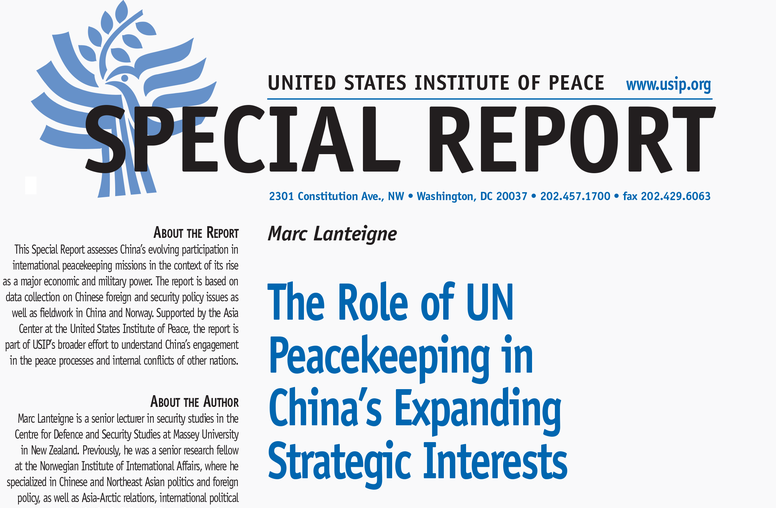
The Role of U.N. Peacekeeping in China’s Expanding Strategic Interests
Despite its growing status as a major economic and military power, China continues to be a strong supporter of UN peacekeeping operations. China is not only the second-largest financial contributor to UN peacekeeping (after the United States), it has roughly 2,500 personnel deployed in ongoing missions, including in active combat zones in Mali and South Sudan—far more than any other permanent member of the UN Security Council. This Special Report examines what China hopes to gain from its participation in UN peacekeeping, as well as the challenges it will face as its troops find themselves in more dangerous “peace enforcement” situations.
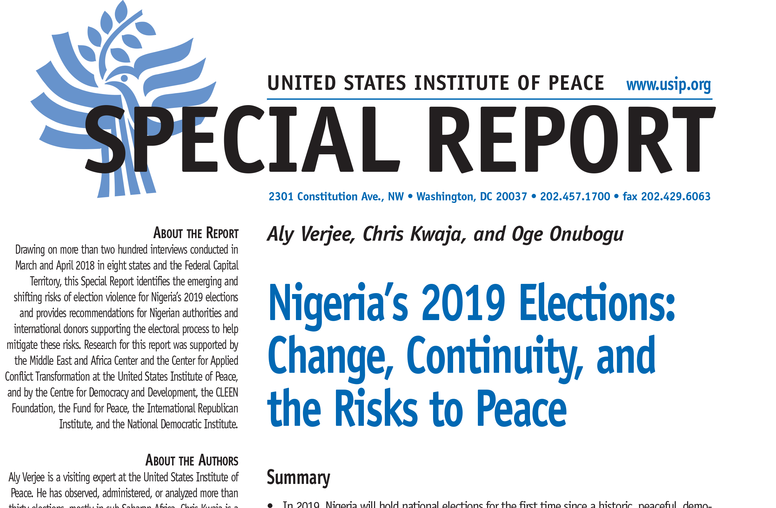
Nigeria’s 2019 Elections: Change, Continuity, and the Risks to Peace
Drawing on more than two hundred interviews conducted in March and April 2018 in eight states and the Federal Capital Territory, this Special Report identifies the emerging and shifting risks of election violence for Nigeria’s 2019 elections and provides recommendations for Nigerian authorities and international donors supporting the electoral process to help mitigate these risks.

The Risks of Violence in Nigeria’s 2019 Elections
In February 2019, Nigerians go to the polls to elect the country’s next president, parliament and state governors. Nigeria’s elections have historically been tense, and as the campaign gets underway there are concerns the upcoming process will see new violence. USIP’s Chris Kwaja, Oge Onubogu and Aly Verjee discuss the significance of the vote, what has changed since the 2015 elections, and suggest what can be done to mitigate risks of violence.

China’s Role in Myanmar’s Internal Conflicts
This report is the first in the Senior Study Groups (SSGs) series that USIP is convening to examine China's influence on conflict dynamics around the world. A group of thirteen experts met from February to June 2018 to assess China’s involvement in Myanmar’s internal conflicts, particularly those in Rakhine, Kachin, and Shan states, as well as China’s impact on Myanmar’s overall peace process.
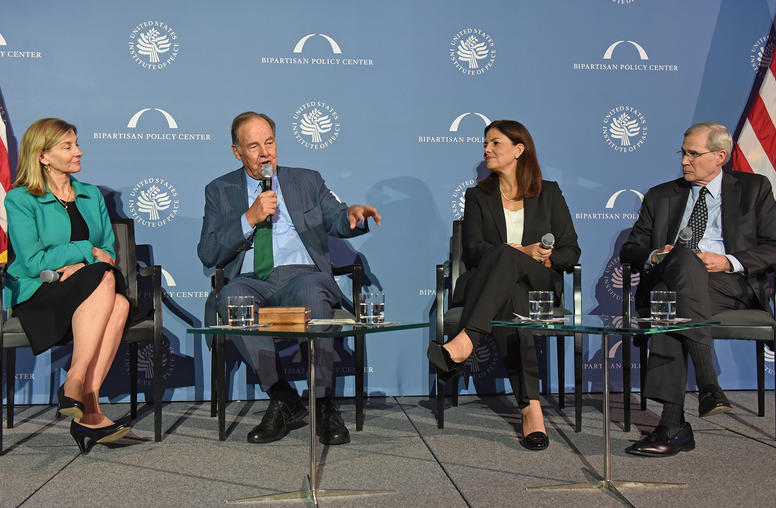
Terrorism has “Changed Dramatically” Since 9/11, Experts say Bipartisan Solutions Needed
Despite counterterrorism efforts that have “thwarted dozens of plots and thoroughly disrupted terrorist capabilities,” we “cannot rest” in our efforts to prevent violent extremism, said Director of National Intelligence Daniel Coats Tuesday night at an event at the U.S. Institute of Peace. The event, co-hosted by USIP and the Bipartisan Policy Center on the 17th anniversary of 9/11, recognized 9/11 Commission chairs Gov. Thomas Kean and Rep. Lee Hamilton for their work leading the Commission and for continuing this work through the Task Force on Extremism in Fragile States.

Nancy Lindborg on Addressing Extremism in Fragile States
Seventeen years after the 9/11 attacks, Nancy Lindborg details the findings of an interim report from the congressionally mandated Task Force on Extremism in Fragile States. Convened by USIP, the Task Force will devise a comprehensive new strategy for addressing the underlying causes of extremism in fragile states, says Lindborg, a member of the Task Force.
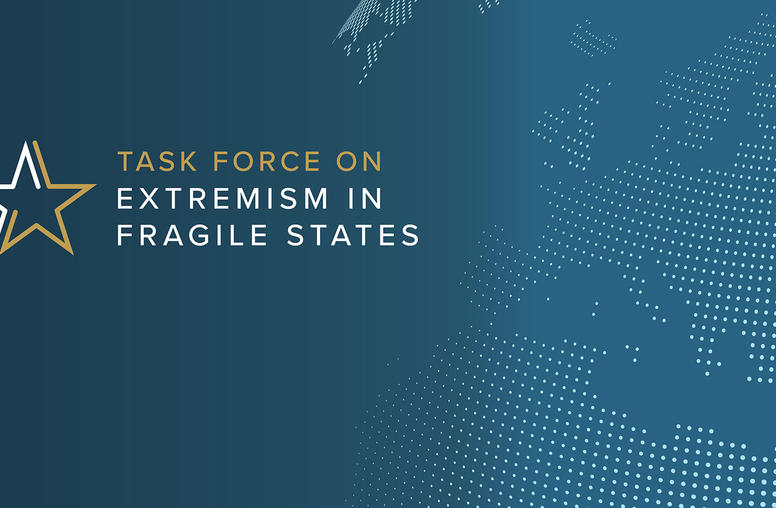
Beyond the Homeland: Protecting America from Extremism in Fragile States
This interim report of the Task Force on Extremism in Fragile States explains why such a preventive strategy is needed and what it might entail. In 2019, the Task Force will propose a comprehensive preventive strategy to mitigate the conditions that give rise to violent extremism.
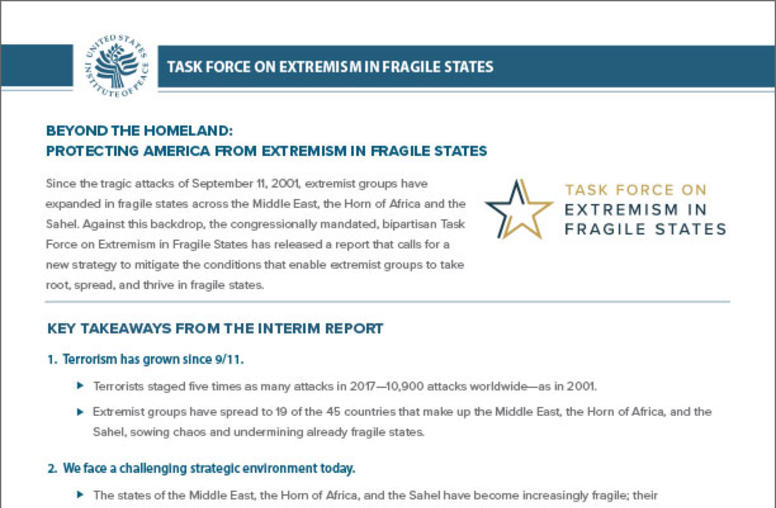
Key Takeaways: Interim Report from the Task Force on Extremism in Fragile States
Since the tragic attacks of September 11, 2001, extremist groups have expanded in fragile states across the Middle East, the Horn of Africa and the Sahel. Against this backdrop, the congressionally mandated, bipartisan Task Force on Extremism in Fragile States has released a report that calls for a new strategy to mitigate the conditions that enable extremist groups to take root, spread, and thrive in fragile states.

Sarhang Hamasaeed on Iraq’s Government Formation
Four months after Iraq held elections, a new government has yet to form as the majority Shia factions remain divided. Sarhang Hamasaeed discusses the complicated route to forming a government and the recent unrest in Basra aimed at the current government for its failure to provide electricity and other basic services.

Taking Stock: Analytic Tools for Understanding and Designing P/CVE Programs
This report examines the various analytic tools that have been developed to understand the causes and dynamics of radicalization and violent extremism. The report assesses the strengths and limitations of these tools in informing the design of P/CVE interventions. It considers micro- and macro-level frameworks and models, and the various contexts in which they may be relevant.